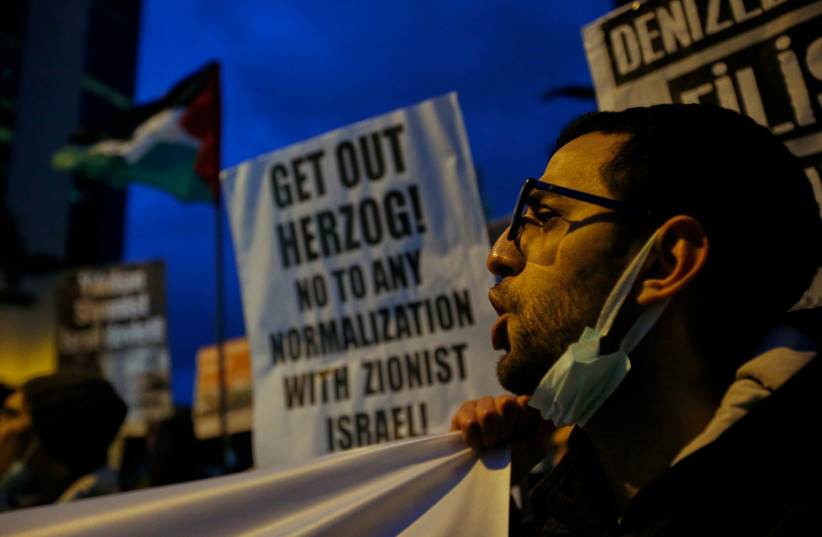Turkey’s ruling AK Party has put out claims over the last two years that it wants reconciliation with Israel. This appeared to culminate in a visit there by President Isaac Herzog last month. However, Turkey’s state-controlled, pro-government media continues to incite against Israel.
This incitement is not merely reporting about the “conflict,” but goes deeper, seeking to inflame tensions by claiming Israeli Jews “stormed” al-Aqsa mosque. The word “storming” has been prepackaged by pro-Palestinian nationalist propaganda for decades, a key word used solely by anti-Israel commentators.
To understand the Turkish media’s agenda against Israel is to understand that Ankara’s ruling party merely puts out feelers regarding “reconciliation” in Israeli media. It uses these claims to push its lobbyists in Washington to try to gain access for Turkey via claims that Ankara is now working with Jerusalem. Ankara’s goal in this equation is to have better relations with the White House.
Turkey enjoyed close relations with the Trump administration, and its ruling party had a rubber stamp to push for invasions of Syria and attacks on Kurds in Iraq and Syria. In addition, Turkey encouraged Azerbaijan to attack Armenia. Meanwhile, Turkey is also buying Russia’s mobile, surface-to-air S-400 missile system. Turkey has remained close to both Russia and Ukraine during the current war.
Turkey has soured relations in Washington through its antics and threats over the years, driven by the AK Party. The ruling party has arrested dissidents and tried to ban opposition media and political parties. It also has threatened NATO allies like Greece and France.

Its behavior has not been as an ally, but rather tended toward obstruction of US policies. As a result, it lost friends in Washington. But now it wants those friends back. It also realized it miscalculated by alienating Israel, Egypt, Saudi Arabia and the United Arab Emirates during a time when Ankara needs more friends.
In this light, Turkey’s ruling party has sought to cultivate friends among pro-Israel voices. Every once in a while it will seek to place an op-ed or an article that claims Turkey and Israel share interests. A recent article claimed that Turkey’s ambassador in the US has hinted that Israel and Turkey might share common interests on issues.
The subtext here is that Turkey might share Israel’s views on Iran. This has been the talking point that Turkey’s lobbyists have pushed for years, claiming that Israel and Turkey are potential allies against Iran. But the truth is that Turkey has hosted Hamas, and Iran funds Hamas. The reality is that Iran and Turkey are closer partners than Israel and Turkey.
NEVERTHELESS, ARAB NEWS noted recently that “an article by Turkey’s ambassador to Washington for Tel Aviv University’s Dayan Center for Strategic Studies journal Turkeyscope has raised questions about the state of Turkey’s relations with Iran. Apart from seeking cooperation between Turkey and Israel in fields of security and energy, Hasan Murat Mercan noted that the two states are under threat from similar regional malign actors, without mentioning Iran.”
This is how Ankara tries to play both sides: it puts out hints that it shares Israel’s views regarding Iran, but doesn’t mention Iran by name.
Meanwhile, Turkey’s real face is shown in its statements.
“Turkey: Israeli-Palestinian tensions could jeopardize relations with Israel,” was a recent headline on Ynet. This is the real Ankara message. Ankara stands firmly with the Palestinians, and has tended to prefer Hamas to the Palestinian Authority.
Ankara’s state media TRT regularly incites against Israel. This week it claimed that “settlers storm al-Aqsa compound as Israeli police force worshipers out.” This is part of the wave of incitement being pushed by Hamas, Iran and other extremists trying to inflame tensions in Jerusalem. Ankara and the right-wing ruling party in Turkey are particularly supportive of messages that want to make “al-Aqsa” an issue.
In the past, voices in the AKP sought to compare the “liberation” of al-Aqsa with Turkey’s recent decision to turn Hagia Sophia into a mosque. Turkish media also highlights other voices that back the Palestinians, such as Qatar’s claim that “Israeli raids on al-Aqsa Mosque must end.”
The statements in Turkish media and by its ruling party show that although there was talk of reconciliation last month, Ankara does nothing to calm tensions in Jerusalem. Ankara prefers to stoke the tensions and print misleading articles than to push for some kind of peace in Jerusalem. In this, Ankara continues to show its Janus-face: it shows one face in Washington, where it tries to pretend that Ankara and Jerusalem share interests, and shows another face to Hamas, Iran and extremists in the region.
Some say that Turkey merely “compartmentalizes” these issues, backing and inflaming Palestinian factions with one hand while wanting more energy ties and deals with Israel with the other. However, Ankara has had ample time to change its tune in its state-controlled media. Because the media takes marching orders directly from the government, the articles in TRT and other media and the words used, such as “storming,” are evidence that Ankara has not changed its real stance.
